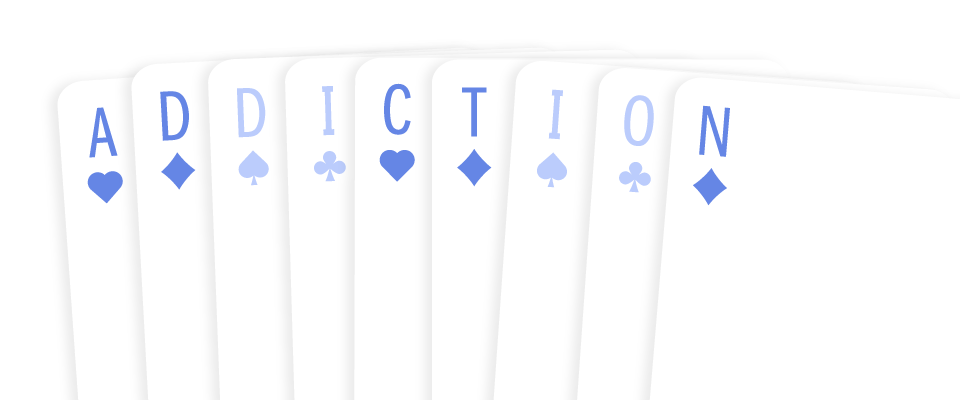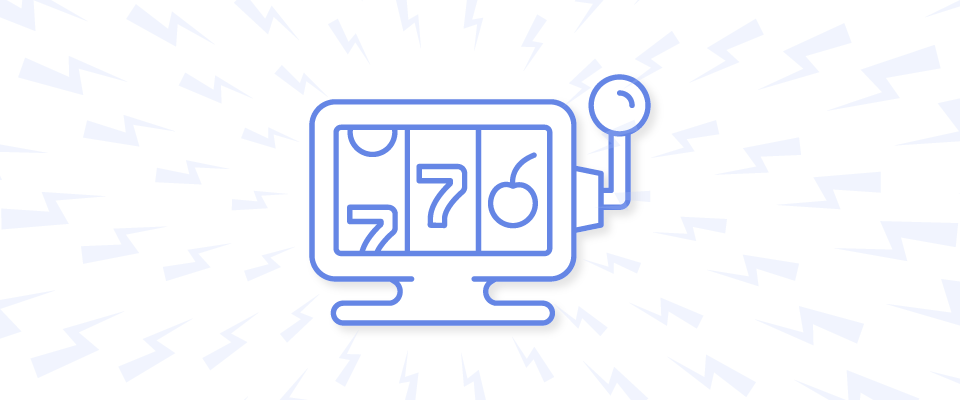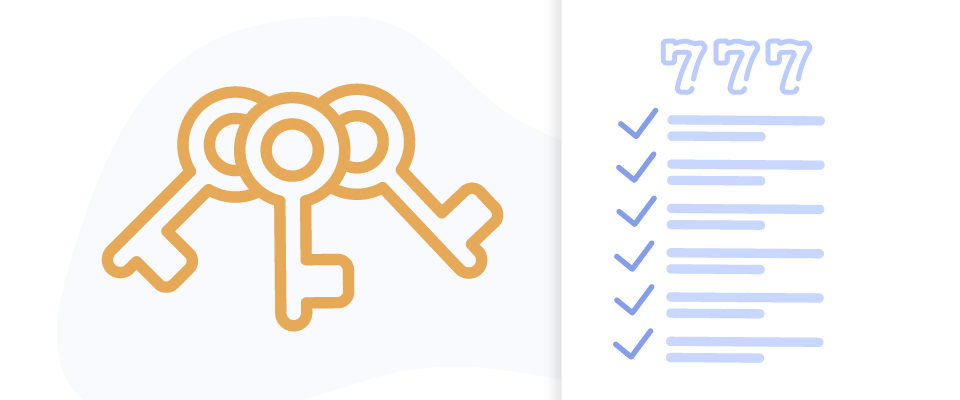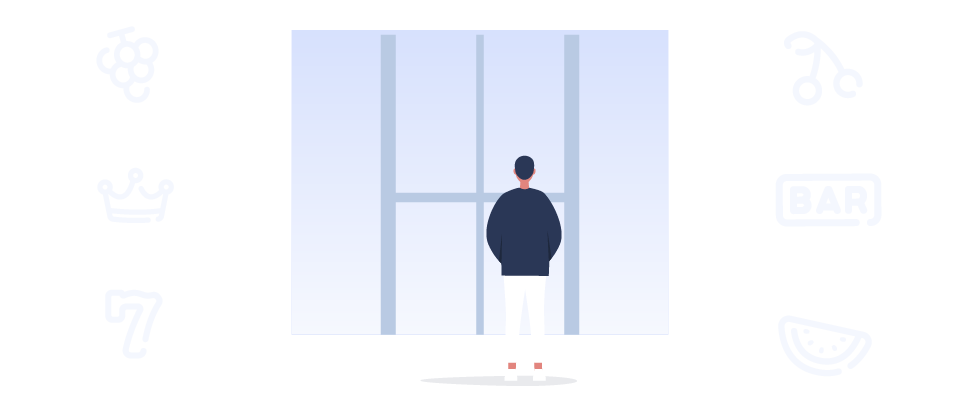How to Recognize If You Have a Gambling Addiction
CasinosLists is an information-centered site that aims to help people make better gambling decisions. We discuss gambling-related products and services and give gamblers a space to leave their reviews.
Responsible gambling is paramount to us, as we want to create a safe gambling environment for our readers. If you believe you might have a problem, we'd like to remind you there are ways to keep yourself in control.
You can use the guide below as a starting point to recognize a gambling addiction in yourself or someone you love. On our site, we cultivate a safe space where players can get educated and receive guidance, so don't hesitate to reach out.
Compulsive Gambling vs. Addiction

For a behavior to be considered compulsive, it must be done repetitively, with disregard for the negative consequences. Usually, people feel strong urges to engage in the behavior to relieve mental distress.
Some examples of compulsive behavior include nail biting, emotional eating, or hoarding. Although compulsion and addiction are sometimes used interchangeably, they are not the same thing.
The biggest difference between addiction and compulsion lies in how they are perceived. A compulsive behavior usually relieves stress, while an addictive behavior is expected to feel good.
Over time, as the addiction settles, the behavior becomes compulsive. On the one hand, the pleasure we derive from it lessens. Regarding gambling, players will bet more and more money, regardless of their budget.
On the other hand, our past pleasurable experiences become obsessive. We become preoccupied with gambling. If we can't engage, we become restless and irritable. Our desire to gamble turns into an urge.
In other words, addiction kicks in while gambling is still pleasurable. Depending on several factors, we can either keep it under control or let it become compulsive. This compulsion can be motivated by two things.
- An obsession with the excitement. When we're gambling to escape negative feelings, we realize that, over time, we need to bet more to achieve the same level of pleasure. The worse our negative feelings are, the stronger the compulsion to escape them.
- Financial distress. When gambling causes financial difficulties, we might think we can only recover our losses through more gambling. Being in debt can also cause depression and anxiety, which gambling can temporarily alleviate.
A player at risk of developing a compulsion to gamble can be diagnosed with a gambling disorder. Contrary to popular belief, you don't have to become bankrupt to be considered an addict.
The worse effects of gambling addiction can come after a long time. This makes an addiction hard to identify, so many problem gamblers don't seek timely treatment.
How to Recognize Problem Gambling

To be diagnosed with a gambling disorder, you'll need to meet at least four of the following criteria over 12 months.
- You felt a need to gamble increasing amounts of money to feel the same excitement.
- You tried to control or stop your gambling but failed.
- You felt restless or irritable when trying to cut down or stop gambling.
- You had persistent thoughts about gambling.
- You often gambled when feeling depressed, anxious, worried, or generally low.
- You often returned to gambling after losing money to "get even."
- You lied to conceal the extent of your gambling.
- You damaged a relationship or career opportunity due to gambling.
- After losing in a casino, you relied on others to obtain money for gambling or necessities.
You could be diagnosed with a mild gambling disorder if you meet four or five of these criteria. Six or seven would indicate a moderate disorder, while eight and above would mean a severe disorder.
Remember
Self-assessment is usually not reliable. As addiction develops, many people experience denial. We tend to minimize the harmful effects of an addictive habit. If you only meet one or two criteria off the list, it could be helpful to express your concern to a therapist.
Stages of Gambling Addiction

Although these stages are not officially recognized in scientific literature, psychologists and social workers often use them. They are meant to help you identify where you stand regarding your habit.
- The Winning Phase.
During this phase, gambling is enjoyable and helps the player relieve stress or other negative emotions. It's common to start developing irrational beliefs over how likely one is to win.
There are few negative consequences, and the gambler feels in control.
- The Losing Phase.
By the second stage, gambling becomes a preoccupation. The player rationalizes their losses with thoughts like "I can afford to lose this" or "I will win it back, anyway."
Losses become bigger or more frequent, so bets also increase in size. There is an increased motivation to gamble to recover lost money, and the behavior doesn't feel as good anymore.
- The Desperation Phase.
Gambling becomes chaotic and might interfere with job or educational responsibilities. The player might lose interest in their previous hobbies, damage their close relationships or completely isolate themselves.
This stage usually comes with other psychiatric symptoms, such as insomnia, depression, anxiety, or anger. They would try to recuperate their losses, often entering into serious debt.
By this point, many gamblers might identify their habit as problematic.
- The Hopelessness Phase.
After substantial losses, the gambler will feel severely depressed. By this phase, many addicts have gone through a divorce and lost their jobs or even their homes. Suicidal thoughts or even attempts are possible.
In some cases, this phase might motivate them to seek treatment.
However, it's also common for them to feel like they're beyond help since they've tried quitting with no success before.
Most addicts seek treatment during the third or fourth phase. Although addiction can settle much sooner, it is hard to identify until it causes severe issues.
Takeaway
You mustn't keep your gambling a secret from your friends and family. They will be much quicker to realize if you're at risk. An objective opinion can sometimes save you from a potential addiction. If you need to conceal your gambling, that should be the first warning that something might be wrong.
What Triggers Problem Gambling?

An important thing to remember is that gambling addiction can happen to anyone. Although people from low socioeconomic backgrounds face a higher risk, the disorder can affect anyone.
It is a common belief that gambling can only be considered an addiction if it causes financial distress. Judging by this, we're inclined to believe that gambling addiction only becomes damaging when you no longer have money to gamble.
Studies suggest that financial literacy has no relationship with gambling frequency. Older people and people with higher household incomes are likely to become frequent gamblers.
It has been shown that the gambling type influences gambling severity. Players who prefer games of skill, such as poker or blackjack, scored lower in gambling severity than mixed gamblers. The latter refers to gamblers who play games of skill and games of chance, such as slots.
This is because games of skill force us to remain aware and make decisions. On the opposite end, games of chance aim to keep us immersed, so we keep spending.
Some of the underlying mechanisms that trigger gambling addiction include the following.
- Gambling provides excitement and relief from negative emotions. This is a powerful reinforcement, especially when we're facing difficult times. Gambling to take our minds off things is not a healthy coping mechanism.
- When we win, the short-term gains feel much more important than the potential negatives. The consequences of problem gambling start showing up after a long time.
Keep in mind
People with poor impulse control are especially vulnerable. Conditions that affect our executive function, like ADHD, autism, schizophrenia, OCD, bipolar disorder, or depression, can make us more likely to become addicted.
According to CHADD.org, as many as 10 to 20% of people diagnosed with ADHD are also problem gamblers. But this is a double-edged sword.
Studies done on problem gamblers have shown impaired executive functioning. This means that, over time, gambling addiction can cause the same poor impulse control seen in people with ADHD.
- Gambling is designed to condition us. It uses a variable ratio schedule of reinforcement, meaning our behavior is rewarded at random. This is known in scientific literature as the most powerful type of conditioning.
There's a fine line between gambling as a healthy hobby and a damaging addiction. Many people manage to keep their gambling under control without too much effort. Some gamble for years without issues, only to trigger an addiction later in life.
The way we perceive gambling plays an important role here. As long as we lead happy lives, we can see gambling as a relaxing pastime.
However, it is when we're using this habit as an escape from our day-to-day life that it becomes a problem. Certain negative life events can push us over that edge.
Example
Suppose you enjoy gambling once in a while, but you've never had any issues with self-control. If you suddenly lose your job, you may be tempted to resort to gambling to ease those negative feelings.
This is where you turn gambling from a hobby into a potential danger. Studies suggest that problem gambling can arise in older women due to Empty Nest Syndrome. This is where parents face loneliness after their kids have gone to college.
Genetic factors are also quoted when discussing this addiction. Problem gambling becomes more likely if you have a parent with an addiction.
Negative Effects of Problem Gambling
Although the negative effects of problem gambling might take years, it's important to have them in mind. Here are some of the most common consequences of gambling addiction.
Financial distress.
It's common for problem gamblers to take consumer credits to cover their expenses or continue gambling. Debt can further motivate us to gamble, creating a cycle leading to bankruptcy or homelessness.
Many gamblers believe that once their debt is cleared, the problem is solved. This motivates them to loan money from family and friends or financial institutions. However, covering debt does not cure the addiction, and the gambler often ends up in a worse situation.
Relationship Problems.
A survey by Gamblers Anonymous suggests that spouses of problem gamblers are directly impacted by the habit. Not only are they left to manage debt, but they often feel hopeless and alone. They often resort to smoking, drinking, compulsive shopping, or other unhealthy coping mechanisms.
Research shows that problem gamblers have a 53.5% lifetime divorce rate. This is fueled by the gambler being deceitful about the habit or, in some cases, downright abusive. As the gambler represses feelings of guilt and shame, they could experience anger outbursts.
Legal problems or imprisonment.
In a recent study, 43.3% of people with gambling disorders reported illegal behaviors. The most frequent activity, as reported by 75.1%, was writing bad checks or paying bills from accounts that no longer had funds.
9.6% reported theft to fuel their gambling. In a report by Forward Trust, almost 23% of English prisoners said they might have a gambling problem.
Suicide risks.
Suicidal thoughts or attempts are common among gambling addicts. The severity of the addiction plays an important role, but there are two factors that can usually predict suicide risk - debt and shame.
In a UK population study, 19.2% of problem gamblers had thought about suicide in the previous year, and 4.7% of them attempted.
Remember
If you're experiencing suicidal thoughts, it's important to get professional help as soon as possible. The more we let ourselves dwell in these thoughts, the more we can trick ourselves into thinking we have no other choice.
Steps toward Treating Gambling Addiction

One of the best practices used to treat addiction is addressing an addict's recovery capital (RC).
RC is an umbrella term covering all of the internal and external resources that a patient uses to sustain recovery.
A licensed professional can guide you to improve your RC across three categories.
Personal recovery capital.
This includes physical health, managing finances and debt, learning healthy coping mechanisms, and receiving education regarding addiction. A therapist can guide you toward valuable resources and equip you with helpful mental tools.
If you can't visit a therapist, there are free online or in-person support groups you can attend. If you're in severe financial distress, you should consider contacting a social worker or NGO.
Social recovery capital.
After taking care of your basic needs, you should reach out to your family and friends. You can find peer support in recovery programs if you've damaged your relationships due to gambling.
You can also cultivate friendships by enrolling in school, employment, or in church. Having a sober, supportive network will help you over the edge of recovery and keep you from relapsing.
Even if your friends and family can't actively support you in your treatment, it can help to have someone to talk to. Sharing your experience and apologizing for your mistakes can help solve the guilt and shame of gambling addiction.
Likewise, the urge to gamble can drastically decrease when we no longer feel lonely and ashamed.
Community recovery capital.
This presumes to rely on community resources to stop your addiction. Social programs, therapists, social workers, or recovery centers will play a huge role in keeping your addiction at bay.
Having routine check-ups with professionals will prevent relapse. Lastly, positive recovery models can motivate you to change for the better.
Typical Cognitive Behavioral Therapy for Gambling Addiction
Cognitive Behavioral Therapy (CBT) is a common form of talk therapy in which patients are taught to identify and change negative thoughts. It helps people overcome anxiety and depression and learn healthy ways to navigate addictions and other disorders.
A typical CBT program could teach you any of the following.
- Recognizing your triggers. This will help you overcome the urge to gamble.
- Dealing with negative thoughts and emotions.
- Planning your time and managing other fulfilling activities.
- Strengthening or repairing your relationships.
- Identifying false beliefs, such as the illusion of control, the need to chase losses, or the idea that gambling is the only solution to your problems.
Many therapists provide 8-week CBT programs for gambling addiction. Depending on the severity, you might need additional time. However, therapy is always worth it.
A good CBT program will help you view money in a different light and manage your finances better. The therapist will also act as an accountability partner, lowering your chances of relapse.
Most importantly, therapy should offer us an objective perspective on our lives. We are not reliable narrators of our stories, which is why a licensed therapist can be invaluable.
How to Deal with a Loved One's Gambling Addiction

You may also face significant risk if you believe someone you love has a gambling addiction. Shared finances can be one of the main concerns, but other factors can directly impact you.
- You may develop your own coping strategies from feeling hurt, betrayed, or hopeless. You must also seek help from a therapist or a support group.
- If the concerned person is not receiving treatment, they might become verbally or physically abusive. It's important to keep yourself safe and establish firm boundaries.
You should remember that gambling addiction is not a flaw of character. It does not indicate malicious intent or a lack of willpower.
Gambling addiction is a recognized mental disorder, and many factors contribute to its onset. The best thing you can do for a loved one is to encourage them to seek professional help.
Keep in mind
Your loved one needs to take responsibility for the addiction. You are doing more harm than good if you're bailing them out of trouble. Clearing their debt, giving them money, or finding excuses for their behavior will only worsen their condition.
You should remember that you are not responsible for their addiction and that you are not equipped to help them overcome it. Establishing boundaries and guiding them firmly toward treatment are your only options.
Of course, this should be done respectfully and from a place of understanding. In many cases, we can aggravate our loved one's addiction by causing them guilt and shame.
If you'd like to be involved in their recovery, you can educate yourself on the topic and keep yourself open to communication. Reassure the addict that you are not blaming them and that they can get better if they reach out.
One of the strongest predictors of successful treatment is a supportive relationship. If your loved one is concealing their gambling, remember that they usually do that out of shame.
You can help them out of this condition by maintaining healthy communication. However, we are only human. It won't be possible to stay cool and collected if we let their habit affect us.
This is why we must closely monitor our feelings and ensure the addiction won't cause us any financial problems.
